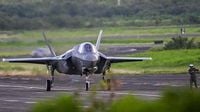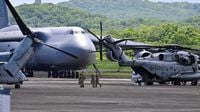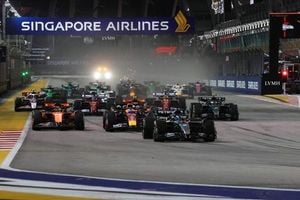The political heat in the Caribbean has reached a boiling point as the United States, under President Donald Trump, ramps up its military presence off the coast of Venezuela—a move that has drawn international condemnation, ignited fierce debate at the United Nations, and set the stage for a dramatic confrontation with President Nicolás Maduro’s embattled regime. At the same time, the Venezuelan opposition has found new momentum with María Corina Machado, a prominent activist and recent Nobel Peace Prize laureate, who has become the face of resistance against Maduro’s rule.
In recent weeks, the U.S. has deployed an imposing array of military hardware near Venezuela: three destroyers, one amphibious assault ship, a missile-equipped cruiser, a nuclear submarine, and a squadron of F-35 jets, all backed by 6,500 naval and marine personnel, according to Pars Today and The American Conservative. The official line from the Trump administration is that these actions are part of an intensified campaign to combat drug trafficking. Yet, many analysts—along with a chorus of international critics—have cast doubt on this rationale, noting that Venezuela is neither a primary source of fentanyl nor a major supplier of cocaine to the U.S. market. As Pars Today points out, fentanyl mainly enters the United States from Mexico, and Colombia remains the dominant exporter of cocaine.
Despite these facts, Trump and his Secretary of Defense Pete Hegseth have repeatedly insisted that Venezuela is the main driver of America’s opioid epidemic. Trump has gone so far as to claim that bags of fentanyl and cocaine have been scattered across the ocean by Venezuelan traffickers, though no evidence has been presented to support these assertions. In the past month alone, the U.S. Navy sank four Venezuelan boats in the Caribbean, resulting in over 20 deaths—an action justified by Washington as anti-drug enforcement but widely seen as an escalation toward potential armed conflict.
The international response has been swift and severe. On October 10, 2025, the United Nations Security Council convened an emergency meeting at Venezuela’s request, following the deadly U.S. strikes on speed boats. Members of the UNSC, including Russia and China, voiced grave concerns about the risk of a broader war. Russia’s UN envoy Vassily Nebenzia warned that Venezuela “for several months now has been subjected to unprecedented pressure and threats of military invasion,” while China’s Fu Cong labeled the U.S. actions “unilateral and excessive,” urging Washington to back down to avoid further escalation, as reported by Tehran Times.
Iran also weighed in, with Foreign Ministry spokesperson Esmaeil Baghaei condemning the attacks as “provocative and destabilizing” and warning of the consequences of what he termed Washington’s “lawlessness.” The diplomatic backlash has only intensified as the Trump administration, according to The New York Times, recently rejected a full-spectrum diplomatic overture from the Venezuelan government that would have opened the country’s lucrative oil and gold sectors to American companies and shifted exports away from China, Iran, and Russia. The White House’s decision to halt all diplomatic outreach—confirmed on October 6, 2025, when Trump instructed special envoy Richard Grenell to cease negotiations—signals a hardening of U.S. strategy and a pivot toward regime change.
Within the U.S., the debate has become increasingly polarized. Republicans in the Senate recently voted down legislation that would have limited Trump’s ability to use military force against Venezuela, effectively giving the administration a freer hand. Meanwhile, Trump’s Secretary of State Marco Rubio has become a vocal advocate for regime change, declaring Maduro’s presidency illegitimate due to allegations of electoral manipulation in the July 2024 election—a contest widely criticized by international observers for fraud and repression.
The U.S. has also doubled down on economic and legal pressure. The bounty on Maduro’s head has been raised to $50 million, with Attorney General Pam Bondi accusing him of being “one of the largest narco-traffickers in the world.” Venezuelan Foreign Minister Yvan Gil dismissed the bounty as “pathetic” and “political propaganda.” Yet, the message from Washington is clear: the days of Maduro’s rule are numbered, at least in the eyes of the Trump administration and its allies.
Amid this geopolitical drama, the Venezuelan opposition has found renewed hope in María Corina Machado. On October 10, 2025, Machado was awarded the Nobel Peace Prize for her efforts to promote democracy in Venezuela. Her leadership during the 2024 presidential election, though ultimately unsuccessful due to widespread electoral fraud, has made her a symbol of resistance. Machado has been forced into hiding, coordinating the opposition from the shadows while seeking international support via social media.
Machado’s Nobel win has not been without controversy. The Iranian embassy in Caracas lambasted the award, calling it “nothing but a mockery of the true meaning of peace,” and accused Machado of advocating for foreign military intervention in Venezuela. Still, her dedication of the prize to the “suffering people of Venezuela and to President Trump for his decisive support of our cause” has been warmly received in Washington. Trump, for his part, has publicly acknowledged Machado’s gesture, telling reporters, “The person who actually got the Nobel Prize called today, called me and said, ‘I’m accepting this in honor of you, because you really deserved it.’ A very nice thing to do.”
The Nobel committee’s decision has, if anything, strengthened the opposition’s hand and deepened the alignment between U.S. policy and the anti-Maduro movement. Machado’s supporters believe she is now poised to play a leading role in any post-Maduro government, especially if U.S. intervention tips the balance. Her patient, unyielding defiance of the regime—while many opposition leaders have fled or been jailed—has made her the opposition’s standard-bearer at a moment of unprecedented crisis.
Inside Venezuela, tensions are running high. The ruling United Socialist Party of Venezuela (PSUV) has begun recruiting citizens for possible war, and President Gustavo Petro of neighboring Colombia has placed his country’s armed forces on alert, fearing the conflict could spill across borders. Meanwhile, Trump’s maximum pressure campaign—intended to curb migration—has, in reality, fueled a new wave of Venezuelan migrants seeking refuge in the U.S., a contradiction noted by Pars Today.
As the world watches, the standoff between Washington and Caracas threatens to spiral into open conflict. The convergence of military posturing, diplomatic deadlock, and a resurgent opposition—now buoyed by the Nobel Peace Prize—has made the situation more combustible than ever. Whether Trump’s strategy leads to regime change or a protracted standoff remains to be seen, but one thing is certain: the fate of Venezuela hangs in the balance, and the stakes could not be higher.





